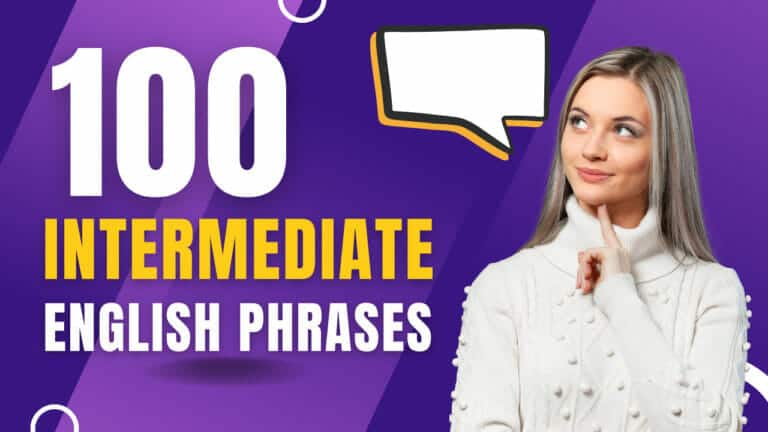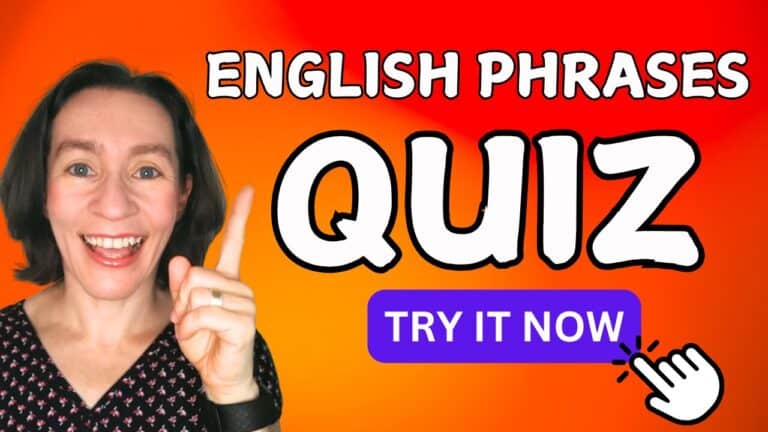
What are interjections?
Interjections are words used to express emotion. There are hundreds of them, and they are very common in everyday English conversation.
Learning from conversations is a great way to learn English more naturally! That’s why all the lessons in my Everyday English Speaking Courses are based on conversations. This way, you can learn English phrases in context, and know what to say when you’re in a similar situation.
Click on the link below to learn more about the Everyday English Speaking Courses. You can also try some free sample lessons, and if you like them, sign up to get the full course.
Examples of Interjections in English Conversation
The best way to learn interjections is not by studying a list, but by learning how each one is used in real conversations. Here are 10 common interjections in English and examples of their use in conversations:
Wow
Use this interjection to express surprise.
“My son got a full scholarship to Harvard!”
“Wow – good for him! What’s he going to study?”
Depending on the intonation, wow can express positive surprise or negative surprise:
“I got a promotion at work!”
“Wow! Congratulations!”
“My husband was just fired from his job.”
“Wow – I’m sorry to hear that.”
Ouch / Ow
Use these to express pain in the moment when you hurt yourself:
“Ow!”
“What happened?”
“I banged my knee on the corner of the table.”

Ew / Ick / Yuck / Ugh
Use these interjections to express disgust.
“While cleaning the house, I found a dead rat under the bed.”
“Ew!”
Aha!
Use this interjection when you make a sudden discovery or realization.
“I’m having a problem with my printer. Could you take a look?”
“It doesn’t look like there’s a paper jam. What happens when you try to print?”
“I get an error message that says ‘cannot find printer.'”
“Aha! That’s the problem – you don’t have the printer software installed.”

Shh
Use this interjection to tell somebody to be quiet.
“Shh! The movie’s about to start.”

Oops / Whoops
Use these interjections when you make a mistake (or to react to someone else’s mistake).
Example 1 (making a mistake):
“Oops – I just spilled my soda all over the table.”
“I’ll get some paper towels to clean it up.
Example 2 (reaction to a mistake):
“I borrowed a book from my teacher and then left it on the bus.”
“Whoops! Was she mad?”
Woohoo! / Yay! / Hurray! / Huzzah!
Use these interjections to express happiness or excitement.
“Were you able to get tickets to the football game?”
“Yes – I got the last two before they sold out!”
“Woohoo! I can’t wait!”

Duh / Whoop-dee-doo / La-dee-dah / Pffft
Use these interjections to express sarcasm. They should only be used with very close friends, because they would be offensive and inappropriate in a business context or a social context.
Duh is used in reaction to an extremely obvious statement:
“Hey, did you know you can share pictures on Facebook?”
“Duh.”
Whoop-dee-doo is used when you want to say something is not as great as it seems. It’s like “Who cares?”
“I won $20 in the lottery!”
“Whoop-dee-doo.”
La-dee-dah is also used to express “I don’t really care,” in reaction to somebody else trying to sound impressive or show off:
“My boyfriend bought me a Ferrari.”
“Well, la-dee-dah.“
Pffft is used to sarcastically dismiss or disagree what the other person says:
“The Red Sox are going to win the World Series this year!”
“Pffft. In your dreams!”

Awww
Use this interjection in reaction to something cute or adorable.
“Here’s a picture of my daughter – she’s two years old.”
“Aww, what a cutie!”

Um / Uh
Use these interjections to pause while you think of what to say next.
“How many students are there at your university?”
“Um, I’m not sure. I think around 2,000 – but I’ll have to check the website.”

Now you know some interjections for expressing emotion when you speak English!
There are even more in this list of interjections. Learning these and using them correctly will help your spoken English sound more natural, more like a native speaker.
And for more conversation-based lessons, come join my Everyday English Speaking Courses, so that you can improve your speaking quickly and easily.
I’m curious, what are some interjections in your native language? Are some of them similar to or different from the ones we have in English? Let me know, it will be interesting to find out.











